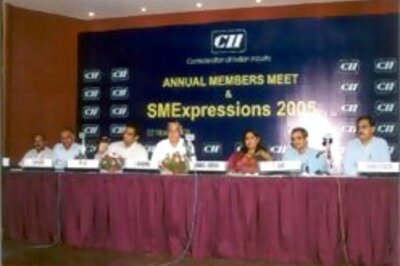
views
LONDON: Investment banks cut the chances of Britain and the European Union agreeing a post-Brexit trade deal on Thursday while bookmakers slashed the odds to 50% after leaders failed to break an impasse in talks.
British Prime Minister Boris Johnson and European Commission President Ursula von der Leyen met on Wednesday to try to break the deadlock, but said significant gaps remained and set a Sunday deadline to decide on their next steps.
JPMorgan reduced the chances of a trade deal to 60% from 66% and said the probability could fall below 50% if progress is not made soon. Citi warned that the chances of a deal have fallen materially, although it still thinks one is more likely.
JPMorgan analyst Malcolm Barr said deadlines have come and gone before and negotiations could continue beyond Sunday.
“But the need to make preparations for the regime shift of ‘no deal’ is pressing, and taking such actions alongside the talks increases the sense that the two sides would be ‘going through the motions’ rather than being committed to concluding a deal,” Barr said in a note to clients.
“In the absence of significant progress toward an agreement by the end of the weekend, the odds of a deal will fall below 50%,” JPMorgan’s Barr added.
Concerns that the window to agree a deal was disappearing were also felt in currency markets on Thursday, where the pound shed 1%, and in stock markets where bank share prices dropped sharply.
Rabobank cut the chances of a deal to 60% from 70% and ING lowered their forecast for a deal to 50/50 from previously predicting a 60% probability of an agreement.
An underlying confidence among banks that, on balance, Brussels and London will reach a deal on trading relations from next year contrasts with a more cautious betting market.
Paddy Power and Betfair are offering odds with a 50% probability of a no-deal, a jump from a 33% on Wednesday.
The odds of no-deal have also risen to 58% on betting exchange Smarkets, up sharply from the 19% priced in last week.
Economists polled by Reuters between Nov. 26 and Dec. 1 had found a median 35% chance of a no-deal, down from 40% the previous month.
In every poll Reuters has conducted since Britain’s 2016 Brexit referendum vote to exit the EU, respondents have said the most likely outcome was still some form of free trade deal for goods.
(Editing by Alexander Smith, William Maclean)
Disclaimer: This post has been auto-published from an agency feed without any modifications to the text and has not been reviewed by an editor
Read all the Latest News, Breaking News and Coronavirus News here




















Comments
0 comment